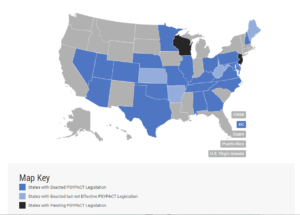Is therapy right for me?
The short answer is, YES! Most people find benefit in therapy, whether for support, to discuss and sort through decisions or life changes, to increase self-knowledge, or to learn and practice skills in order to address difficulties. Therapy provides the space for people to focus on themselves, to sort through their thoughts and ideas without judgment or some of the pressure that can be present when talking with a family member or friend, and to oftentimes experience a different way of communicating with someone whose primary focus is on helping them to improve their life.
In which states is telehealth available?
I have Authority to Practice Interjurisdictional Telepsychology (APIT) in PSYPACT participating states. Currently, the states colored in blue are participating states, so if you reside in one of these states or DC, we can work together.
Please refer to www.psypact.org/psypactmap for an up-to-date listing if you have additional questions.
How do I make an appointment or schedule an evaluation?
To set up an initial therapy appointment, please contact my office at 210-201-2933 or by email at Info@ComharCounseling.com. If you leave a voicemail or send an email, we will schedule a time to talk on the phone, usually 5-10 minutes, in order for you to tell me a bit about what services you are seeking and for us to schedule your initial appointment.
What to expect?
It is common for those new to therapy to feel both eager and uncomfortable about beginning the process. I hope you will find that your process in therapy will be a supportive, challenging, and growth-producing experience. Prior to your first session, you will be sent a link to your client portal, where you will be able to complete all of the initial paperwork. Once you arrive to my office, please have a seat in the waiting area and I will come and meet you there. If we are meeting via telehealth you will receive a one-time use link 48 hours before our scheduled meeting.
Your first session is the opportunity for us to begin getting to know one another and we will discuss what brings you in. It usually takes 2-3 sessions for us to determine whether or not we would be a good fit to work together, as "fit" is such an important part of the therapeutic process. Generally, therapy will be a conversation focused on you and what you want to discuss, but I will ask questions and, as we get to know one another, we will work to understand what will be most helpful to you and how to incorporate those pieces into your life. You can anticipate talking about your goals, where you find yourself stuck, feelings and thoughts you are having, along with your history and examining patterns in your life. Throughout the process, you will find a non-judgmental space where you can talk about what is on your mind. Therapy may incorporate drawing, writing, or other activities.
If you are active in your treatment, you will develop methods and skills to address problems in your life and to develop a strong sense of inner personal power. We will work together to enable you to lead a more productive and fulfilling life without the barriers of emotional blocks, inner conflict, and repeated patterns of experience. The overarching goal of therapy is to help you to participate more fully in life and discover the possibilities within yourself.
Insurance?
I accept BCBS and Aetna PPO plans and am an out-of-network provider for all other insurances including plans available through the Marketplace Exchange. Please check with your insurance provider about both in- and out-of-network benefits. Occasionally plans have "carve-outs" for behavioral health, meaning that a company other than BCBS or Aetna manages your benefits, and is out-of-network. Please be aware that even when using insurance, there will likely be a deductible, coinsurance, and/or copay.
Upon request, I will provide you with a superbill, or specific receipt, for you to request direct reimbursement from your insurance carrier.
There are several reasons I do not accept insurance, and why you may not want to submit for reimbursement:
- Use of insurance requires a mental health diagnosis and does not cover couples counseling, many other stressors, and more insurances are not covering psychological evaluation. A mental health diagnosis becomes a part of a client’s permanent health record, which, depending on the diagnosis, may impact future insurance coverage or necessitate disclosing a “pre-existing condition.”
- Your records are open to audits by the insurer at any time, meaning that they have access to details about you that you may wish kept confidential.
- The insurer will have a say in your treatment. Most insurance companies require some sort of treatment plan to be submitted by in-network providers, which then can be used to determine the number of sessions your insurance may cover, session length, or the specific type of intervention or goals to be addressed. The treatment (to a degree) becomes more about addressing the insurance provider’s demands than what may be in the best interest of the individual client.
Paying privately allows for your file and everything we discuss to remain confidential and focused on your individualized needs. Submitting claims yourself will require a mental health diagnosis, but still allows more freedom in determining treatment options. Submitting claims will, in most cases, count towards your deductible – please check with your specific provider.
Fees?
My fees vary depending on the services provided. Please contact the office for pricing.
A written good faith estimate of anticipated charges is available upon request for those individuals who are paying out of pocket and not submitting for reimbursement through their health insurance. When considering finances, it is advisable to plan for weekly sessions for an ongoing time.
Additional information about good faith estimates can be found at www.cms.gov/nosurprises or by calling 800-985-3059.
For psychological testing, please note: For each hour spent administering tests, there is typically an additional hour charged to score, interpret, review records, and prepare the report.
Psychological evaluations require a 2-hour minimum appointment per session. You will be billed for the initial consultation and each testing session at the time of service, with the remaining balance for scoring, interpretation, and preparation of the report due at the time of the feedback session, when you will receive a copy of the report.




